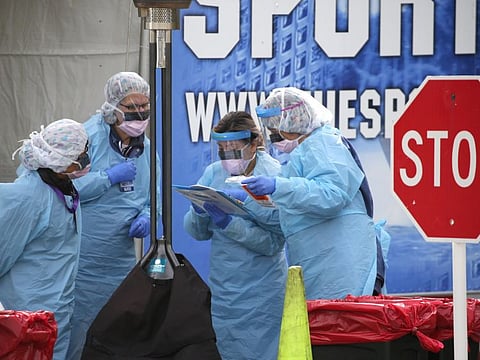Coronavirus: The havoc wrought upon us
It is our burden, as God’s intellectually inquisitive creatures, to explore the reason

Covid-19, a deadly but truly democratic virus propelled by the conviction that all men are created equal, continues to wreak havoc on us worldwide, one and all, and to lay waste to what constitutes our narrative of the quotidian.
Across the globe, the norms of our daily lives have virtually ground to a halt — surreally put on hold, as it were — as have the norms of our global village become upended, from the Far East to the Middle East and from China to America.
And, wait. Experts tracking the spread of the virus predict that soon — sooner than we care to imagine — we all will face a surge in its global onslaught, leading to locked down countries replicating Italy, where a nation of 60 million had already been brought to a standstill. In short, before you dare hope that things will get better, expect them to get worse.
For every event in human existence, even where that event is catastrophic, there lies a benign intent. So it says in our Holy Texts. God is just, we are told, even in His seeming fury. And not only just, but rational
Why is all this happening to us? What is the reason? Why is God — seen in virtually all religions as a munificent deity — visiting such unspeakable suffering, such gratuitous disruption, on his folk?
For every event in human existence, even where that event is catastrophic, there lies a benign intent. So it says in our Holy Texts. God is just, we are told, even in His seeming fury. And not only just, but rational.
A catastrophe, at first blush, may seem wanton and absurd, but only in the cold light of hindsight, do we come to realise that God always makes good the havoc wrought upon us.
Consider this case in point from recent history: The Boxing Day, 2004 undersea earthquake in the Indian Ocean, followed by a series of massive tsunami waves — with their epicentre in Sumatra, Indonesia — that grew to 100 feet and headed inland, killing an estimated 228,000 people in 14 surrounding countries.
That made it one of the deadliest disasters in human history. Additionally, the disruptions to living conditions, commerce and travel were incalculable.
Even in this dreadful tragedy, we discern the hand of God — or, if you prefer, we’ll say ‘nature’, His instrument — infused a benign intent, for with outside help, the survivors were later able to build better villages and towns, better schools and hospitals, better marketplaces and government buildings, and finally better lives and better standards of living.
Consider yet another case in point (one I had written about elsewhere, several years ago) from a more distant past: The bubonic plague, known as the Black Death, the most severe epidemic in human history, that hit Europe between 1347 and 1351. The outbreak decimated virtually half the population of the continent, true, but ended up reshaping, and felicitously so, European life in the decades that followed.
For centuries, you see, economic disparities in European society, among social classes, smothered social progress. Agriculture was appallingly inefficient, with farmers abusing and exhausting the land. As the population grew, new land was hard to find and food more scarce.
So, guess what? nature intervened. The demographic disaster caused by the plague, involving the death of millions, turned out to be, dialectically, nature’s gift to Europeans, for once the impact of these calamitous events was absorbed, a fall in the price of food resulted, and the shortage of labour brought a rise in wages, which translated into a rise in the standard of living of the masses. Even serf-labour, the servile status of urban workers, receded.
In like manner, what we call natural disasters, like hurricanes, floods, droughts, storms, volcanic eruptions, forest fires, name it, are nature’s way of doing business, speaking its own language with us.
Telling us who is boss around here. Telling us it knows best. Telling us that when it exposes humans to the caprice of the inhuman, it does so for a reason — so that the souls of men are restored to grace.
Coronavirus? Covid-19? Well, as we used to say in my neck of the woods, in the refugee camps where I grew up, albeit a touch flippantly, mish mohem. That is, forget about it! We are assured by our omniscient deity, in the Holy Texts bequeathed us, that, without fail, after immense grief comes bountiful relief.
The virus afflicting the global village, including our Arab neighbourhood in it, happened because it was meant to happen, for otherwise it would not have happened.
Only over the sum of time — not when we are still too close to the fact — will we get to discern how the order of the universe and of our estate in it is subject to His reason. It is our burden, as God’s intellectually inquisitive creatures, to explore that reason.
— Fawaz Turki is a journalist, lecturer and author based in Washington. He is the author of The Disinherited: Journal of a Palestinian Exile



